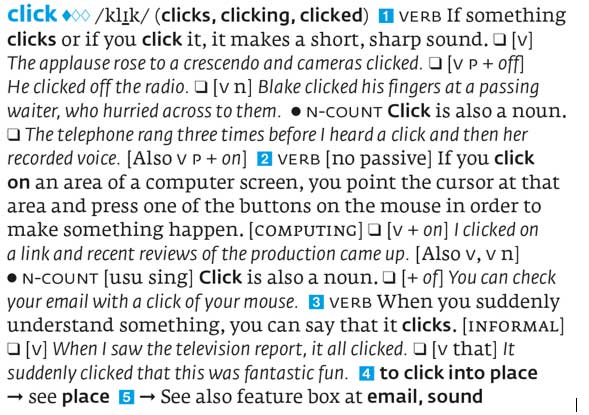In the 30 years since the publication of the first COBUILD dictionary, a whole flurry of new words has come into the language and as they’ve caught on and become part of everyday usage, they’ve been added to the dictionary.
I’m not just talking about the trendy new coinages that occasionally hit the headlines; think omnishambles, binge-watch or post-truth. Most of these never become used widely or frequently enough to make it into a learner’s dictionary like COBUILD. The occasional exception is words like selfie, which appeared and became ubiquitous with surprising speed. More interesting, perhaps, are new uses of existing words which sneak into our vocabularies almost unnoticed.
In 1987, the meanings of post were all about mail, sticks in the ground, and jobs, no mention back then of the kind of post many of us put on social media daily now. Clicking was still just about making a noise, not something you do to a link, which itself was still a generic connection rather than a way of switching between webpages. And a thread was a piece of cotton or the flow of your argument, rather than a series of online comments.

The entry for click from the first edition (1987)

The entry for click from the ninth edition (2018)
Not all these shifts have been in the online world either, other technological developments have also generated new usages. Back in the 80s, wireless was just an old-fashioned word for radio. Nowadays, you might have wireless headphones, speakers, microphones, or keyboards. If you talk about a hybrid now, you’re more likely to be referring to a type of semi-electric car than a plant or animal bred from two different species.

The entry for wireless from the first edition (1987)

The entry for wireless from the ninth edition (1987)
With each new edition of a dictionary, lexicographers are keeping an eye on corpus data to see what new words are coming into use, and also to pick up on new senses of familiar words. Like new coinages, new uses need to reach a certain frequency and distribution threshold for inclusion, first in larger native-speaker dictionaries, then, as they become more common-place into learner’s dictionaries too. Which words do you think might take on new meanings in the coming years?
This blogpost has been written by Julie Moore, who is an ELT lexicographer and materials writer.



